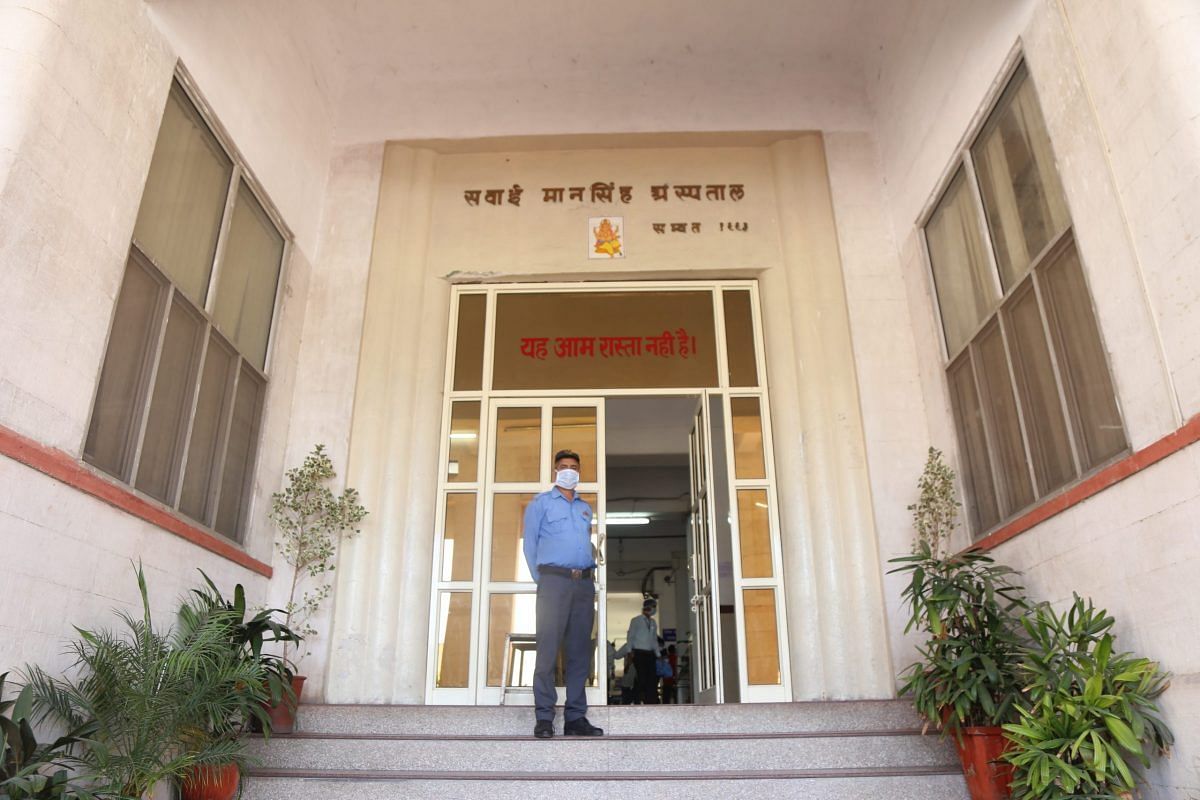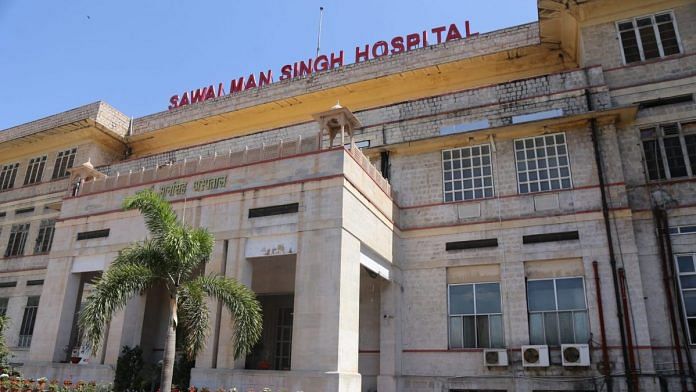New Delhi: As early as March, Jaipur’s Sawai Man Singh (SMS) Medical College and Hospital, the district’s nodal facility for Covid-19, had become an example to follow for the rest of Rajasthan in how it managed the health crisis.
According to data on 27 June (the latest available district-wise data), the hospital had an 86 per cent recovery rate with 1,003 of the 1,242 patients being discharged, while 67 were shifted to other hospitals. There were 162 deaths. The state has since stopped releasing district-wise data.
Government officials credit SMS hospital’s recovery rate to the state’s overall performance of 97 per cent.
The hospital stopped being a Covid-exclusive facility on 1 June, but continues to treat and admit patients.
“SMS has a lot to do with Rajasthan’s high recovery rate,” Rohit Kumar Singh, former additional chief secretary (ACS) for health in Rajasthan, told ThePrint. “They were transparent with research methods and shared results with us at every step. When they did something, others would follow, and the results have reflected in the whole state.”

Many factors contribute to SMS hospital’s success — from making sure patients were well aware of precautions, fine-tuning their Covid screening system to experimenting with drugs to help recovery and collaborating with district officials to implement timely interventions.
Also read: A woman reads the Quran, 13-yr-old says ‘I’m scared’: How Jaipur is dealing with Covid-19
Covid screening, treatment experiments
What is significantly compelling in the hospital’s strategy is the investigation technique it mastered to examine Covid patients, regardless of whether they are symptomatic or not.
“Every patient brought in was thoroughly checked. Most patients look normal and are outwardly asymptomatic. But a quick check of their oxygen levels often reveals they’re sub-normal. There’s a lot more damage to the body than meets the eye,” Dr Sudhir Bhandari, principal of SMS Hospital said.
Doctors began looking at oxygen levels of asymptomatic patients in April. This was before it was introduced in the Ministry of Health’s revised discharge policy on 9 May.
The hospital also built its testing capacity to handle 3,500 RT-PCR tests daily.
Once a patient tested positive, treatment began like clockwork.
SMS hospital was among the first in the world to administer hydroxychloroquine (HCQ) with HIV antiretroviral drugs to treat Covid-19, as part of the World Health Organization (WHO)’s Solidarity trial.
Both sets of drugs have since become a point of contention within the medical fraternity, with WHO pulling both from its trial.
“We are continuing to give HCQ, because our original observations still hold for mild patients. We’re using other drugs and tests to strengthen our protocol so we can catch the illness early on and remedy it,” Dr Bhandari told ThePrint.
He even wrote to the WHO disputing its decision to remove HCQ from the trial but says he is to receive a reply.
SMS Hospital is now complying with the Solidarity trial by testing the effects of remdesivir on a section of mild to moderately ill patients. It is simultaneously administering the investigational drug tocilizumab, a drug traditionally used for rheumatoid arthritis but has shown encouraging results in patients who develop Covid-19 related pneumonia.
“Once we get a suspected or positive case, we assess whether they need to be kept in one of our wards or sent home for isolation. The wards are divided based on the severity of symptoms. For the 15 per cent of patients that develop pneumonia, we prescribe remdesvir and tocilizumab. For mild cases, it’s HCQ and azithromycin,” said Dr Raman Sharma, professor of medicine at SMS Hospital.
Also read: Dexamethasone, favipiravir, plasma therapy — how India’s Covid care has evolved in 5 months
A healthy govt-hospital nexus
Doctors at SMS Hospital worked closely with the state and district administrations to ensure patients were kept well-informed of precautions and people came in for treatment on time.
During the peak of the state’s Covid-19 crisis, from March through to May, the hospital had kept aside 300 intensive care unit beds for severe patients and another 1,200 for moderate to mildly symptomatic ones.
While big metros like Delhi, Mumbai, and Ahmedabad reeled under a surge in deaths — since patients were coming for treatment during the late stages of their illness — Rajasthan didn’t quite see the same phenomenon. Of the 23,174 cases reported in the state so far, only 497 had died as on 11 July.
“We would sweep neighbourhoods for positive cases and deploy rapid response teams for contact tracing. A bulk of the samples would go to SMS, and they would give us the results in no more than 24 hours,” said Dr Nattoram Sharma, Jaipur’s chief medical officer.
After being examined at the hospital, asymptomatic patients fit enough to go home were sent into self-isolation. Others who needed to be admitted were subject to a thorough examination, including a high-resolution computed tomography (HRCT) scan of the chest to look for scarred tissue, and an angiogram to find possible blood clots. Patients admitted were usually discharged after a week of treatment.
“If a patient’s health showed signs of deterioration, we would check to see if their cytokine levels were raised. This indicates an overproduction in a person’s immune cells, which we should then treat accordingly,” said SMS’s professor of medicine, Dr Raman Sharma.
“The key is not slacking on doing these tests when necessary. Every patient needs to be examined with the same rigour, whatever be their symptoms. There’s still much we don’t know about the disease.”
In June, SMS Hospital was named a centre for excellence in Covid-19 treatment by the government of Rajasthan. It is now considered the nodal facility for Covid across the state.
Rohit Kumar Singh, the former additional chief secretary, said the hospital, with its stellar infection management, had set the treatment standard for all districts in the state.
“There are two parts to infection management. The first is containing the spread through contact tracing and enforcing social distancing. The second part is when someone tests positive and you treat them. This is where SMS played a stellar role,” Singh said, adding they were chosen as an investigational site because they were a “premier institute” with the facilities and experience required to conduct clinical trials.
“The state government was always accessible to us, and any problems in shortage of PPE etc were resolved quickly. We didn’t face any pressure from the government,” said Dr Bhandari.
Also read: A look inside Rajasthan’s closed highway dhabas when lockdown leaves no one to feed
A low recovery rate
Apart from the RT-PCR tests — SMS Hospital has conducted about 1,50,300 — positive patients also undergo scans and their oxygen levels are regularly checked to monitor them, even when sent home.
Despite these measures, some patients don’t make it. Of Rajasthan’s 497 deaths, SMS hospital accounted for 162 as on 27 June.
Dr Ajit Singh, a senior consultant with SMS, said the facility’s nodal status played a part in the hospital’s high death count.
“Because we were the nodal facility, other hospitals even outside Jaipur referred their patients to us. Often they would come at the terminal stage, and most of them had co-morbidities, which is why they succumbed. As per our calculations, 30 per cent of patients can be saved if they come to the hospital on time,” he said.
Also read: Health ministry website takes down paper that said community transmission was on since April




Covid test